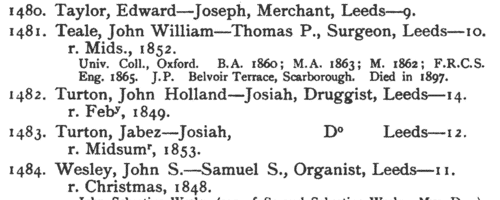Our indexes include entries for the spelling tuke. In the period you have requested, we have the following 237 records (displaying 101 to 110):
Dissolutions of Partnerships
(1840)
Trade partnerships dissolved, or the removal of one partner from a partnership of several traders, in England and Wales
| Sample scan, click to enlarge

|
Trustees and Solicitors
(1840)
Trustees appointed to take over bankrupts' estates in England and Wales, and their solicitors. Trustees are often friends or relatives of the bankrupt: and/or principal creditors
| Sample scan, click to enlarge

|
Post office clerks and officials
(1841)
The General Post Office, at St Martin's-le-Grand, was the headquarters for the English postal system. Its departments included the Money Order Office, Ship Letter Office, Dead and Returned Letter Office and the Inland Letter Office. The Two Penny Post was a separate establishment. The officials, clerks, assistants and sorters are listed in the Royal Kalendar. | Sample scan, click to enlarge

|
Dissolutions of Partnerships
(1842)
Trade partnerships dissolved, or the removal of one partner from a partnership of several traders, in England and Wales
| Sample scan, click to enlarge

|
Bankrupts' Assignees
(1844)
Assignees of bankrupts' estates (usually principal creditors and/or close relatives of the bankrupt) in England and Wales | Sample scan, click to enlarge

|
Bankrupts' Assignees
(1844)
Assignees of bankrupts' estates (usually principal creditors and/or close relatives of the bankrupt) in England and Wales | Sample scan, click to enlarge

|
Boys entering Leeds Grammar School
(1844)
The admission books for Leeds Grammar School from 1820 to 1900 were edited by Edmund Wilson and published in 1906. The series of registers is almost complete for the period, there being in addition admission registers for the Lower (or Commercial) Department from 1856 to 1865, and lists of boys in the school in 1856, and in the Commercial Department in 1861. The entries are arranged by date or term of admission: a sequential number is given first, then surname, christian name, and, after a dash, father's christian name, occupation, and address; another dash, and then the age of the boy at admission, and often his year of leaving (with the abbreviation r. for 'removed' or 'left'). r.* means left without notice; (o) or S. or Stranger or Foreigner indicates a boy not on the foundation. The editor was unable to divine the meaning of the abbreviation (Q) or the asterisks prefixed to most entries in 1856 to 1860, but dutifully copies them into the text. In smaller type he then proceeds, where possible, to add some information about the boy's subsequent career. | Sample scan, click to enlarge

|
Insolvents
(1844)
Insolvency notices for England and Wales: insolvency often caused people to restart their lives elsewhere, so these are an important source for lost links | Sample scan, click to enlarge

|
Insolvents in Bankruptcy
(1844)
Insolvency in bankruptcy notices for England and Wales: insolvency often caused people to restart their lives elsewhere, so these are an important source for lost links | Sample scan, click to enlarge

|
Railway Subscription Contracts
(1845)
£21,386,703 6s 4d was promised by about 10,000 subscribers of less than £2,000 per contract to the nearly 200 railway bills deposited in the Private Bill Office during the Session of Parliament for 1845. This alphabetical list gives the full names of the subscribers (surname first), description (i. e., occupation), place of abode, a numerical reference to the title of the railway, the amount subscribed to each, and total. There is a separate key to the titles of the railways. | Sample scan, click to enlarge

|
Research your ancestry, family history, genealogy and one-name study by direct access to original records and archives indexed by surname.











